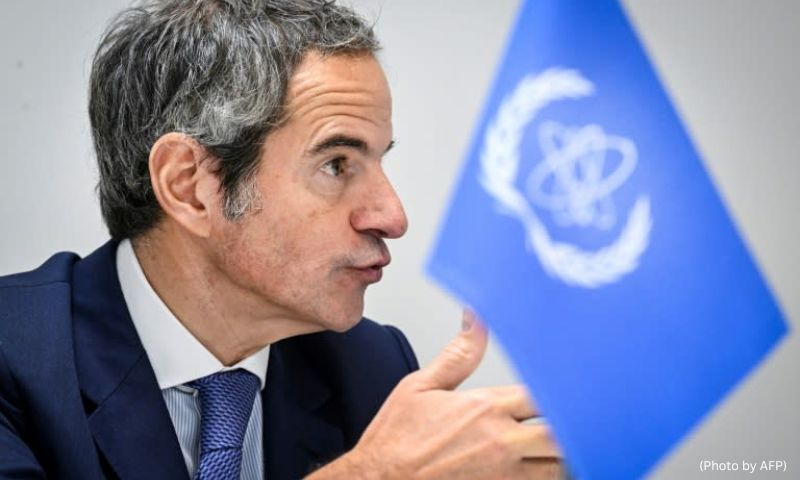BAKU, Azerbaijan: Director General of the International Atomic Energy Agency (IAEA) Rafael Grossi has reiterated that international inspectors have not found any evidence that could suggest that Iran is seeking to build nuclear weapons.
Grossi made the clarification on the sidelines of the Baku Climate Change Summit on Tuesday evening and expressed hope for resolving the alleged safeguards issues with Iranian officials during his visit to Tehran, reports Islamic Republic News Agency.
“That is this gap, this lack of confidence, which we should not allow to grow into a self-fulfilling prophecy of using nuclear facilities as targets,” the IAEA chief who will leave for a two-day trip to Tehran on Wednesday told reporters, adding that “We have a problem that we need to solve.”
In response to the question whether the agency is concerned about Iran’s nuclear weapons development, he clarified that the IAEA has no evidence to prove such a claim.
Earlier in an interview with CNN, Grossi said the purpose of his trip to Iran which certainly won’t be the last one is important to find diplomatic solutions to remaining issues.
This week, IAEA Director General @rafaelmgrossi heads to Tehran for talks on Iran’s nuclear program. “We are in a moment of particular tension,” Grossi tells me. “They have a lot of nuclear material… They do not have a nuclear weapon at this point. And we have to negotiate.” pic.twitter.com/uLN9WDd4Nq
— Christiane Amanpour (@amanpour) November 12, 2024
Referring to the future the Joint Comprehensive Plan of Action (JCPOA), he said: This is not a secret issue. Since the new government came into office, it is looking for solutions in this regard.
According to the announced plan, Grossi will meet with Iran’s President, Foreign Minister and the head of the Atomic Energy Organization of Iran.
Two weeks ago, Iran’s Deputy Minister for Legal and International Affairs, Kazem Gharibabadi who met with the IAEA chief in Vienna announced that Grossi’s trip will be the continuation of interactions between Iran and the Agency, as well as in line with the joint statement issued by the two sides on March 4, 2023 that also called for resolving the remaining safeguard issues with a professional approach and without the agency’s bias.
Prior to the JCPOA agreement, the West presented Iran’s nuclear program as a threat based on the 7th chapter of the UN Charter and tried to securitize and link its solution with military action and sanctions.
The IAEA in it’s over a dozen reports has verified Iran’s compliance with the 2015 agreement, but non-adherence of the JCPOA by Britain, France, and Germany, along with the United States prompted Tehran to gradually scale down its commitments.
The measures were announced exactly a year after then US President Donald Trump withdrew his country from the JCPOA and re-imposed economic sanctions unilaterally on Tehran.
In 2018, Iran activated the dispute resolution mechanism within the JCPOA joint commission at the level of the foreign ministers of the remaining signatories. As a result, the JCPOA member parties issued a statement and made 11 commitments to compensate for the economic damages caused by the unilateral action of the United States.
READ ALSO: COP29: Climate Disaster Fund for Developing Countries ‘Ready’
After taking office in January 2021, the Democratic administration under Joe Biden condemned the unilateral action by its predecessor, but it too continued with the so-called maximum pressure campaign against Iran coined by Trump who is about to return the White House in January 2025 following his recent election win.
Iran has, time and again, said that its measures are reversible if the other parties, including the US abide by the JCPOA clauses.
AFP adds: International Atomic Energy Agency chief Rafael Grossi is set to visit Tehran on Wednesday for crucial talks on Iran’s nuclear programme, warning just ahead of his trip that room for manoeuvre is narrowing.
Israel has accused Iran of seeking to acquire nuclear weapons, a claim Tehran denies.
The two countries have traded missile strikes this year, as tensions soar over Israel’s war on Hamas in Gaza and Hezbollah in Lebanon.
The strikes have brought to the surface their years-long shadow war and fuelled fears of a wider Middle East conflict.
“The margins for manoeuvre are beginning to shrink,” Grossi said in an interview with AFP ahead of his visit, adding that “it is imperative to find ways to reach diplomatic solutions”.
While the IAEA is allowed to carry out inspections in Iran, Grossi stressed the need for “more visibility” into Iran’s nuclear programme, given its scale and ambition.
Grossi’s trip comes after Donald Trump — who pulled out of a hard-won nuclear deal with Iran negotiated under Barack Obama — was voted back into the White House.
Trump said last week that he was not seeking to harm Iran and instead wanted its people to have “a very successful country”, while insisting “they can’t have a nuclear weapon”.
In 2015, major world powers including the United States reached an agreement with Iran on its nuclear programme after 21 months of talks.























